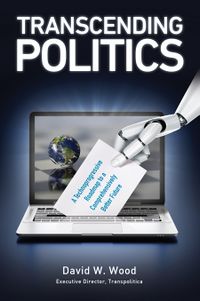Chapter 13. "Politics and leadership"

Chapter 13. "Politics and leadership" is the title of the final Chapter in the book Transcending Politics by David Wood.
"Chiselled in gold letters on a granite monument in Highgate Cemetery, North London, one of the most famous sayings of Karl Marx echoes from beyond the grave:
The philosophers have only interpreted the world in various ways. The point is to change it.
The preceding chapters of this book contain their fair share of interpretation. But what next? If someone is at least broadly sympathetic to the technoprogressive vision I have outlined, and would like to hasten the accomplishment of that vision, what steps should they take?
The suggestions I make in this final chapter belong under three headings: connect, act, and iterate:
- Connect – find and join communities of people whose goals and projects resonate with you, and where your own efforts can be meaningfully amplified
- Act – identify useful individual tasks where you can make a difference, and become involved
- Iterate – be ready to start small, to venture outside of your comfort zone, to set and respect deadlines by when you will review progress with community members, to learn from both the failures and successes you experience, and to repeat the whole process, again and again, gaining more and more insight and effectiveness.
A simple way to move forwards, on all three of these headings, is to visit the Transpolitica projects webpage[1], transpolitica.org/projects, find something on that page that appeals to you, get started, and reconnect regularly.
Alternatively, you may prefer to become involved in projects taking place outside the Transpolitica umbrella. I give many examples in the Afterword that follows this chapter."
- - David Wood, Executive Director, Transpolitica[2]
Towards super-collaboration[править]
Of the many sets of technology that I mentioned in this book, perhaps the most important is collabtech – technology that will improve our ability to collaborate with one another.
With the right kind of collaboration, the different skills and insights that are possessed by people around the world can add up to an extraordinary technoprogressive force.
Four breakthroughs ahead[править]
The first of these breakthroughs is the cognotech revolution covered in the previous chapter: people using biohacking and brainhacking in order to reach higher levels of both personal and group effectiveness.
The second is the revolution in artificial intelligence in deep machine learning covered in Chapters 4 and 5: people taking advantage of...
Friction and decentralisation[править]
At the same time as we talk about the potential for disruption, we should also talk about the potential of the opposite of disruption, namely stasis. Stasis is when communities become stuck, or, less dramatically, when they take a long time to change. To extend the metaphor, stasis arises when there is too much friction, that is, resistance to change.
Blockchain and politics[править]
If DLT's can enable “frictionless commerce”, could they also enable “frictionless governance” and “frictionless politics”?
Los Angeles based attorney Shiva Bhaskar has suggested, in an article entitled “How Blockchain Can Improve Politics”, that blockchain might have applications in[3]: Counting votes more reliably,...
Action required[править]
As I said at the start of this chapter, concrete progress with the technoprogressive project needs people willing to connect, act, and iterate.
The point of connecting is, emphatically, not just to circulate ideas in endless social media “sharing” or “retweeting”. It’s to join teams of people who are likely to progress some of the unfinished business of the technoprogressive initiative. There's plenty of real work that needs doing.
Iterating towards the Singularity[править]
I see the set of likely futures for humanity, around the middle of this century, as being split into two main groups. In one group of futures, society will reach a state of sustainable equitable abundance; in the other, it will plunge down into a new dark age of ignorance and destruction.
Building bridges to better politics[править]
Motivational speaker Jim Rohn offers a memorable statement by the impact on us of the people with whom we frequently interact[4].
You are the average of the five people you spend the most time with.
In other words, you should choose these five people carefully!
External links[править]
- Buy the Book
- For convenience of readers, this page lists all the endnotes from Transcending Politics, in easily clickable form.
References[править]
- ↑ “Tasks awaiting volunteers” https://transpolitica.org/projects/
- ↑ https://transpolitica.org/ Transpolitica Homepage
- ↑ “How Blockchain Can Improve Politics” https://medium.com/@shivagbhaskar/how-blockchain-can-improve-american-politics-9a2016680f10
- ↑ “Official Jim Rohn Facebook page” https://www.facebook.com/OfficialJimRohn/posts/10154545230540635